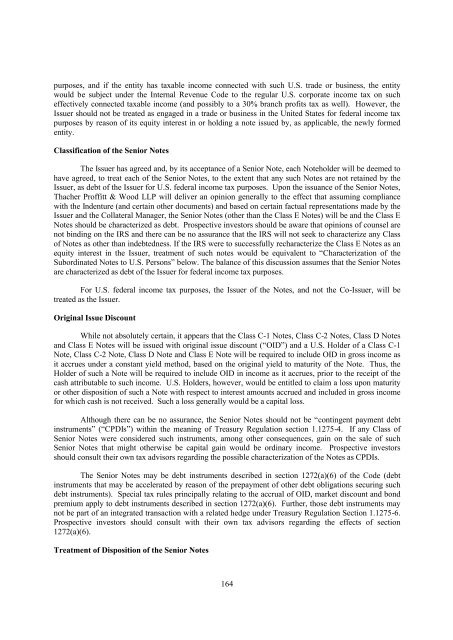Attentus CDO I Offering Circular - Irish Stock Exchange
Attentus CDO I Offering Circular - Irish Stock Exchange
Attentus CDO I Offering Circular - Irish Stock Exchange
Create successful ePaper yourself
Turn your PDF publications into a flip-book with our unique Google optimized e-Paper software.
purposes, and if the entity has taxable income connected with such U.S. trade or business, the entity<br />
would be subject under the Internal Revenue Code to the regular U.S. corporate income tax on such<br />
effectively connected taxable income (and possibly to a 30% branch profits tax as well). However, the<br />
Issuer should not be treated as engaged in a trade or business in the United States for federal income tax<br />
purposes by reason of its equity interest in or holding a note issued by, as applicable, the newly formed<br />
entity.<br />
Classification of the Senior Notes<br />
The Issuer has agreed and, by its acceptance of a Senior Note, each Noteholder will be deemed to<br />
have agreed, to treat each of the Senior Notes, to the extent that any such Notes are not retained by the<br />
Issuer, as debt of the Issuer for U.S. federal income tax purposes. Upon the issuance of the Senior Notes,<br />
Thacher Proffitt & Wood LLP will deliver an opinion generally to the effect that assuming compliance<br />
with the Indenture (and certain other documents) and based on certain factual representations made by the<br />
Issuer and the Collateral Manager, the Senior Notes (other than the Class E Notes) will be and the Class E<br />
Notes should be characterized as debt. Prospective investors should be aware that opinions of counsel are<br />
not binding on the IRS and there can be no assurance that the IRS will not seek to characterize any Class<br />
of Notes as other than indebtedness. If the IRS were to successfully recharacterize the Class E Notes as an<br />
equity interest in the Issuer, treatment of such notes would be equivalent to “Characterization of the<br />
Subordinated Notes to U.S. Persons” below. The balance of this discussion assumes that the Senior Notes<br />
are characterized as debt of the Issuer for federal income tax purposes.<br />
For U.S. federal income tax purposes, the Issuer of the Notes, and not the Co-Issuer, will be<br />
treated as the Issuer.<br />
Original Issue Discount<br />
While not absolutely certain, it appears that the Class C-1 Notes, Class C-2 Notes, Class D Notes<br />
and Class E Notes will be issued with original issue discount (“OID”) and a U.S. Holder of a Class C-1<br />
Note, Class C-2 Note, Class D Note and Class E Note will be required to include OID in gross income as<br />
it accrues under a constant yield method, based on the original yield to maturity of the Note. Thus, the<br />
Holder of such a Note will be required to include OID in income as it accrues, prior to the receipt of the<br />
cash attributable to such income. U.S. Holders, however, would be entitled to claim a loss upon maturity<br />
or other disposition of such a Note with respect to interest amounts accrued and included in gross income<br />
for which cash is not received. Such a loss generally would be a capital loss.<br />
Although there can be no assurance, the Senior Notes should not be “contingent payment debt<br />
instruments” (“CPDIs”) within the meaning of Treasury Regulation section 1.1275-4. If any Class of<br />
Senior Notes were considered such instruments, among other consequences, gain on the sale of such<br />
Senior Notes that might otherwise be capital gain would be ordinary income. Prospective investors<br />
should consult their own tax advisors regarding the possible characterization of the Notes as CPDIs.<br />
The Senior Notes may be debt instruments described in section 1272(a)(6) of the Code (debt<br />
instruments that may be accelerated by reason of the prepayment of other debt obligations securing such<br />
debt instruments). Special tax rules principally relating to the accrual of OID, market discount and bond<br />
premium apply to debt instruments described in section 1272(a)(6). Further, those debt instruments may<br />
not be part of an integrated transaction with a related hedge under Treasury Regulation Section 1.1275-6.<br />
Prospective investors should consult with their own tax advisors regarding the effects of section<br />
1272(a)(6).<br />
Treatment of Disposition of the Senior Notes<br />
164

















